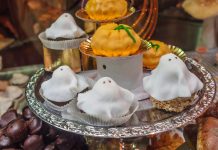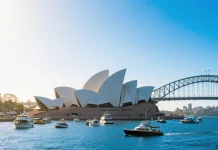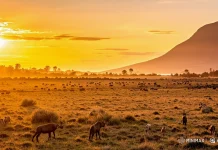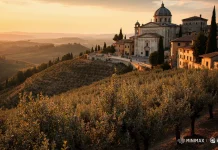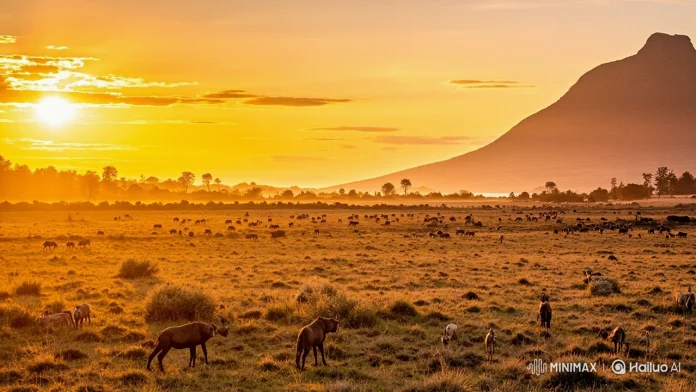**
Lily had always been captivated by the allure of South Africa. The tales of the great wildebeest migration and the stunning beauty of the Garden Route had long danced in her imagination. Finally, she set foot on this land of wonders. However, upon arriving in Kruger National Park, she was overwhelmed by the vastness and didn’t know where to start to witness the grand migration. Along the Garden Route, due to lack of proper planning, she missed some of the most scenic spots. In fact, every year, countless tourists, just like Lily, come to South Africa full of anticipation but end up with regrets due to insufficient preparation. But worry not! After reading this guide, you’ll be able to unlock the charm of South Africa with ease and enjoy an in – depth journey between the wild animal migration and the enchanting Garden Route.
Why Choose South Africa?
South Africa is a land like no other, a place where nature’s raw power and breathtaking beauty converge. It is a haven for wildlife enthusiasts, offering the chance to witness one of the most spectacular natural events on Earth – the great animal migration. The country’s rich biodiversity, with its diverse ecosystems ranging from savannahs to mountains and coastal plains, provides a home to an astonishing variety of wildlife.
For adventure seekers, South Africa presents a plethora of opportunities, from thrilling game drives to exhilarating hikes in the mountains. The Garden Route, in particular, is a paradise for road – trippers, offering a scenic journey along the coastline, with each turn revealing a new and awe – inspiring view. Whether you’re a nature lover, a thrill – seeker, or a culture vulture, South Africa has something to offer that will leave you with memories to last a lifetime.
Things to Know Before You Go
Best Time to Visit
- Summer (December – February): This is the peak tourist season, with warm temperatures ranging from 20 – 30°C. It’s an ideal time for beach vacations along the Garden Route and for wildlife viewing in Kruger National Park, as the animals are more active. However, it can get quite crowded, and accommodation prices may be higher.
- Autumn (March – May): The weather is still pleasant, with temperatures dropping slightly to 15 – 25°C. The landscapes are painted with the colors of autumn, making it a great time for photography. The animal migration in Kruger National Park is also still ongoing, providing excellent viewing opportunities.
- Winter (June – August): Winter in South Africa is relatively mild, with temperatures between 10 – 20°C. It’s a good time to visit if you want to avoid the crowds. In the Western Cape, this is the whale – watching season, as southern right whales come to the shores to breed and calve.
- Spring (September – November): The country comes alive with colorful wildflowers, creating a vibrant and beautiful landscape. It’s a great time for nature walks and for experiencing the unique flora of South Africa. The animal migration in Kruger National Park is also starting to pick up, with herds on the move in search of fresh grazing.
Visa / Entry
Most visitors to South Africa require a visa. The application process involves submitting the necessary documents, including a valid passport, proof of accommodation, and a return flight ticket. It’s advisable to apply for the visa well in advance, as the processing time can vary. When entering the country, make sure to comply with customs regulations, which prohibit the import of certain items such as fresh fruits and meats.
Transportation Tips
- By Air: South Africa has several international airports, with Johannesburg’s O.R. Tambo International Airport being the busiest. From there, you can easily connect to domestic flights to reach destinations like Kruger National Park or the cities along the Garden Route.
- By Car: Renting a car is a popular option, especially for exploring the Garden Route. The roads are generally well – maintained, and driving gives you the flexibility to stop and explore at your own pace. However, be aware of the local traffic rules and driving on the left – hand side of the road.
- By Bus: There are reliable bus services that connect major cities and towns in South Africa. They are a cost – effective way to travel, but may not offer the same level of flexibility as driving.
Budget Reference
- Accommodation: In Kruger National Park, a basic lodge or campsite can cost around \(50 – \)100 per night. Luxury lodges, on the other hand, can range from \(300 – \)1000 per night. Along the Garden Route, budget hotels start at around \(80 – \)150 per night, while mid – range options are in the \(200 – \)300 range. High – end resorts can cost upwards of $500 per night.
- Food: Street food and local restaurants offer affordable options, with a meal costing around \(10 – \)20. Fine dining experiences in cities or at luxury resorts can set you back \(50 – \)100 or more per person.
- Transportation: A domestic flight within South Africa can cost anywhere from \(50 – \)200, depending on the distance. Renting a car for a week can cost around \(300 – \)600, including insurance. Bus tickets are relatively inexpensive, with prices ranging from \(10 – \)50 for long – distance journeys.
Highlights of the Itinerary
Must – Visit Attractions
- Kruger National Park – The Wildlife Wonderland: Kruger National Park is a vast expanse of wilderness, covering an area of approximately 2 million hectares. It is home to an incredible diversity of wildlife, including the famous “Big Five” – lions, leopards, rhinos, elephants, and African buffalos. But the real highlight is the annual animal migration. Every year, millions of wildebeests, zebras, and antelopes embark on a journey in search of fresh grazing and water. As they move across the plains, they create a spectacular sight, a river of animals stretching as far as the eye can see.
- The Great Migration: The migration is a perilous journey. As the herds cross rivers, they face the danger of crocodiles lurking in the waters. The sight of wildebeests leaping into the river, some being snatched by crocodiles, is both heart – stopping and awe – inspiring. The migration usually starts around May or June and continues through September or October.
- Other Wildlife: Besides the migrating herds, Kruger National Park is also home to a variety of other animals. Elephants roam the plains in family groups, using their trunks to feed on leaves and branches. Lions laze around in the shade, waiting for the perfect opportunity to hunt. Leopards, with their spotted coats, are masters of camouflage, often difficult to spot in the thick vegetation. Rhinos, despite their large size, are surprisingly agile and can be seen grazing in the grasslands.
- Game Drives: The best way to experience the wildlife in Kruger National Park is through game drives. There are both self – drive options and guided game drives led by experienced rangers. Guided drives are highly recommended, as the rangers have an in – depth knowledge of the park’s wildlife and can point out animals that you might otherwise miss. They can also provide interesting insights into the behavior and ecology of the animals.
- The Garden Route – A Scenic Paradise: The Garden Route is a stretch of coastline that runs from Mossel Bay to Storms River, offering some of the most beautiful scenery in South Africa.
- Starting from Port Elizabeth: As you begin your journey along the Garden Route from Port Elizabeth, you’ll be greeted by the sight of the ocean stretching out as far as you can see. The coastal roads offer panoramic views of the sea, with white – capped waves crashing against the shore.
- Tsitsikamma National Park: This park is a nature lover’s paradise. It combines the beauty of the forest with the ruggedness of the coastline. There are several hiking trails that wind through the forest, where you can spot a variety of bird species and small mammals. The highlight is the suspension bridge over the Storms River, which offers breathtaking views of the river and the surrounding landscape.
- Mossel Bay – Whale Watching Capital: Mossel Bay is known as the whale – watching capital of South Africa. From June to November, southern right whales come to the bay to breed and calve. You can take a boat tour to get up close and personal with these gentle giants. Watching a whale breach the surface, its massive body soaring out of the water, is an experience that will stay with you forever.
- Cape Town and Table Mountain: As you reach the end of the Garden Route in Cape Town, you’ll be greeted by the iconic Table Mountain. This flat – topped mountain dominates the city’s skyline. You can take a cable car to the top, where you’ll be rewarded with panoramic views of Cape Town, the Atlantic Ocean, and the surrounding landscapes. On a clear day, you can see as far as the Twelve Apostles mountain range and the Cape of Good Hope.
Hidden – Gem Experiences Loved by Locals
- Addo Elephant National Park: This park is not as well – known as Kruger National Park but is home to a large number of elephants. It also has a diverse range of other wildlife, including lions, leopards, and several species of antelopes. The park offers a more intimate wildlife viewing experience, with fewer tourists.
- Hermanus: A small town along the Garden Route, Hermanus is famous for its land – based whale watching. There are cliff – top paths where you can watch whales without having to take a boat. The town also has a charming atmosphere, with local shops and restaurants to explore.
Season – Specific Activities
- Summer: In summer, besides wildlife viewing in Kruger National Park, you can enjoy beach activities along the Garden Route. The warm waters are perfect for swimming, surfing, and sunbathing.
- Autumn: Autumn is a great time for wine – tasting in the Western Cape. The vineyards are ablaze with the colors of autumn, and you can sample some of South Africa’s finest wines at local wineries.
- Winter: As mentioned before, winter is the whale – watching season. It’s also a good time for bird – watching, as many migratory birds visit South Africa during this time.
- Spring: Spring is the season of wildflowers. You can take a drive through the Namaqualand region, where the desert comes alive with a carpet of colorful wildflowers.
Avoiding Pitfalls
Common Traps
- Overpriced Safari Tours: In some areas near Kruger National Park, there are tour operators that charge exorbitant prices for safari tours. Do your research and compare prices before booking a tour. Look for reputable operators with good reviews.
- Pickpockets in Cities: In busy cities like Johannesburg and Cape Town, be aware of pickpockets, especially in crowded areas such as markets and public transportation. Keep your valuables secure and be vigilant.
Alternative Options
- Accommodation in Kruger National Park: Instead of staying at expensive lodges, consider camping in the park. There are several well – equipped campsites that offer a more affordable option while still allowing you to be close to the wildlife.
- Food in Cape Town: Explore the local markets in Cape Town, such as the V&A Waterfront Market, where you can find a variety of delicious and affordable local food options. This is a great way to experience the local cuisine without breaking the bank.
Safety Tips
- Wildlife Encounters: When on a game drive or in a wildlife area, always follow the instructions of your guide. Do not approach wild animals on your own, as they can be dangerous. Keep a safe distance and respect their space.
- Urban Safety: In cities, avoid walking alone at night in unfamiliar areas. Use well – lit and busy streets, and take precautions when using ATMs or carrying large amounts of cash.
Useful Toolkit
APPs / Websites
- Safari Now: This website is a great resource for booking accommodation and safari tours in South Africa. It has a wide range of options to choose from and user reviews to help you make an informed decision.
- Google Maps: Essential for navigation, especially if you’re driving along the Garden Route or exploring different areas in South Africa. It can help you find the best routes and locate nearby attractions.
- South African National Parks Website: This website provides detailed information about all the national parks in South Africa, including Kruger National Park. You can find information about park regulations, accommodation, and wildlife sightings.
Local Contacts
When in South Africa, make use of local contacts such as hotel staff, tour guides, and locals. They can provide valuable information about the best places to eat, hidden – gem attractions, and local events. In Kruger National Park, the rangers are a great source of knowledge about the wildlife and the park.
Emergency Contacts
- South African Police Service: 10111
- Emergency Medical Services: 10177
- Your Embassy or Consulate: Make sure to know the contact information of your country’s embassy or consulate in South Africa in case of any emergencies.
South Africa, with its wild animal migrations and the stunning Garden Route, offers a travel experience like no other. Are you ready to plan your own adventure in this amazing country? Do you have any questions about specific attractions or activities? Share your thoughts in the comments section below. We’ll be happy to help you plan your dream trip to South Africa!






